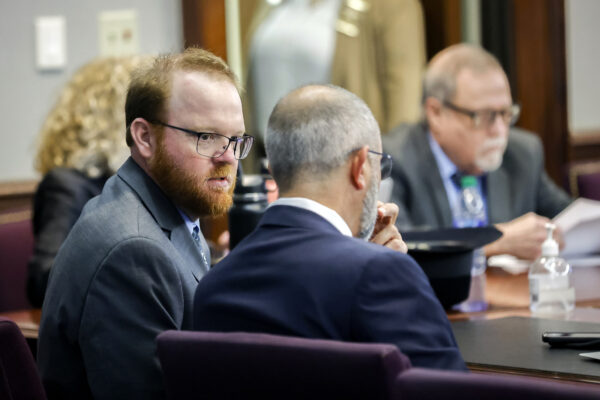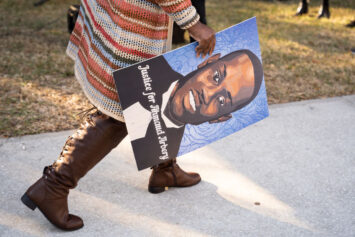After a federal judge rejected the terms of a plea agreement reached between Gregory and Travis McMichael and the Justice Department, both father and son have withdrawn their guilty pleas to hate crimes connected to the shooting death of a Georgia Black man.

Gregory withdrew his guilty plea on hate crimes, kidnapping, and weapons charges related to the murder of Ahmaud Arbery on Thursday, Feb. 3, and his son Travis took his back the following day.
Without these deals in place, the two are set to face federal hate crimes during a trial scheduled to start this Monday, Feb. 7, in U.S. District Court in Brunswick, Georgia.
In addition to the hate crime charges, the three men are charged with one count of attempted kidnapping and one count of having a firearm during a crime of violence.
Presiding over the case is U.S. District Court Judge Lisa Godbey Wood, the judge that rejected the plea agreement which would have given two of the three men convicted of murdering the 25-year-old Arbery 30 years in federal prison, before serving the rest of their state sentencing.
The judge said she did not want to be limited to that number of years to be served in prison, “If I accept it, it locks me in to that sentence.”
Her decision was further cemented after hearing testimony from Travis, especially after hearing the shooter admit for the first time that he pursued and shot Arbery because of his “race and color.”
The agreement noted that Travis McMichael had long espoused racist rhetoric to his friends via text messages and social media, which informed his decisions on that fateful day, Feb. 23, 2020, Reuters reports.
It stated in part, “Defendant Travis McMichael did not belong to any hate groups and did not set out on February 23, 2020, to carry out an act of violence against an African-American person. But he had made assumptions about Ahmaud Arbery that he would not have made if Ahmaud Arbery had been white.”
The millennial admitted that psychologically he associated Black skin “with criminality,” and supported vigilante ideologies that championed harassing, harming, and/or killing Black people, “particularly those he saw as criminal.”
U.S. Assistant Attorney General Kristen Clarke said the Justice Department respected the court’s decision, sharing that the plea agreements were entered “only after the victims’ attorneys informed me that the family was not opposed to it.” This contradicts what the family says.
The family said that the Justice Department made a “backroom deal,” that accommodated the men that were already convicted of killing their relative. Gregory and Travis McMichael were sentenced to life without the possibility of parole plus 20 years for the murder, and William Bryan was sentenced to life with the possibility of parole plus 10 years.
The deceased’s mother, Wanda Cooper-Jones, was surely pleased with Wood’s decision. The family had openly expressed they did not support any plea deal agreement and wanted all three men to stand trial.
On Monday, the family (including the mother) gave emotional appeals to the court about their tremendous loss and why a deal that would allow them to spend time in a relatively less harsh federal prison system versus a Georgia prison would be outrageous and hurtful to them as a collective.
Previously, the family expressed their desire to have the men go to trial to face the hate crime charges in court — counts that are separate from the murder charges they were convicted on.
Now, both Gregory and Travis McMichael are fine with going to trial. The prosecution, this time around, will focus solely on how race influenced their decisions to chase and injure Arbery.
The government will have no hold bars, using as evidence social media, text messages and other correspondence to show a bigoted motivation steeply rooted in who the three men are as individuals.
Robert G. Rubin, the lawyer who represented Travis McMichael in the murder trial, said, as reported by The New York Times, “It’s going to be ugly. There’s no doubt about it.”
One of the statements that the prosecution may lift is Bryan’s allegation that he heard Travis call Arbery the N-word after he shot him. If Travis’s federal defense disputes this claim, and Bryan invokes his Fifth Amendment right not to testify, Travis’ Sixth Amendment right, the right to face his accuser, will be denied.
Despite how ugly it could gets, Judge Wood is trying to make sure the trial is fair. She has made the decision to broaden the pool of potential jurors to extend to over 43 of Georgia’s 159 counties. The court has sent out summonses to approximately 1,000 residents over the diverse canvas of citizens.
While the judge is trying to not have a biased jury, many believe that might be impossible, especially since over the last few days so much attention has been on the plea deal agreement, its rejection, and the men’s reneging on their guilty admissions.
More news from our partners:
A Lack of Capital: Why the Booming Cannabis Industry Is Leaving Black Americans Behind

